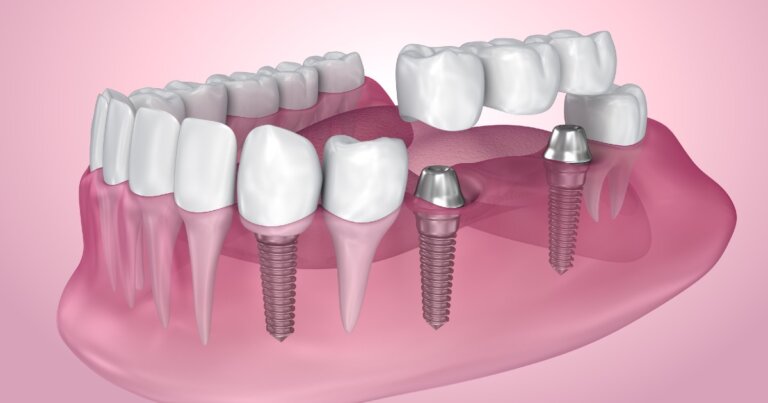Dental Implant Bridge Home Care Instructions

What to Expect After Receiving Your Dental Implant Bridge
A Dental Implant Bridge is a durable and long-lasting solution for replacing missing teeth. By securing artificial teeth on dental implants, it provides stability and function similar to natural teeth. After receiving your dental implant bridge, proper care is essential to ensure long-term success and maintain your oral health.
Oral Hygiene
Maintaining excellent oral hygiene is key to protecting your new dental implant bridge and preventing complications such as peri-implantitis. Follow these important guidelines:
- Brush at Least Twice a Day: It’s important to brush your teeth at least twice daily—once in the morning and again before bed. Ideally, you should also brush after meals to remove food particles and plaque, reducing the risk of bacteria buildup around your dental implant bridge.
- Rinse When You Can’t Brush: If you’re unable to brush after a meal, rinse your mouth with water or an antibacterial mouthwash. This helps clear away food debris and prevent potential plaque formation.
- Upgrade Your Toothbrush: Switching to a soft-bristled toothbrush such as the Curaprox CS5460 Ultra Soft Swiss Toothbrush can help clean around the implant bridge without irritating your gums. Consider using an electric toothbrush like the Philips Sonicare ProtectiveClean 6100, which provides a deep, thorough cleaning, especially around hard-to-reach areas.
- Floss Daily: Flossing is essential for removing plaque and food particles that may get trapped around and beneath your implant bridge. Aim to floss every day, and try Oral-B Super Floss, which is specially designed for cleaning around bridges and implants.
- Consider Using a Water Flosser: A water flosser is a highly effective tool for flushing out debris from between teeth and implants. Using it daily, alongside traditional flossing, helps ensure your mouth stays clean and healthy. Waterpik Aquarius Water Flosser is a popular choice for implant care.
- Use a Gum Care Toothpaste and Mouthwash: Choose a toothpaste formulated for gum health, such as Crest Pro Health Gum Detoxify Toothpaste. Also, rinse daily with an antibacterial mouthwash like Crest Gum Care Mouthwash to prevent peri-implantitis and promote healthy gums.
- Schedule Regular Dental Checkups and Teeth Cleanings: Routine dental checkups and cleanings are vital to maintaining the health of your implant bridge. Your dentist will assess the implant’s condition and remove any plaque or tartar buildup that may lead to issues like gum disease. Regular cleanings every six months are recommended, with checkups at least once a year.
Food and Drink
One of the benefits of a permanent dental implant bridge is that you can enjoy a wide variety of foods without restrictions. However, be mindful of avoiding very hard or sticky foods that could damage the bridge or surrounding teeth.
Managing Pain, Sensitivity, and Swelling
After the placement of your dental implant bridge, you may experience temporary sensitivity to hot and cold foods or beverages. This discomfort typically subsides within a few days.
To manage any pain or swelling, over-the-counter pain relievers such as ibuprofen (Advil) or acetaminophen (Tylenol) can help. A combination of 1000mg of acetaminophen with 600mg of ibuprofen every 4-6 hours (as needed) is a powerful pain management strategy, but always consult your dentist for personalized dosage advice.
Have Questions?
It’s important to talk to your dentist right away if you experience any issues with your dental implant bridge, such as prolonged discomfort, swelling, or an uneven bite. If you have any additional questions about your implant bridge, please contact us.

